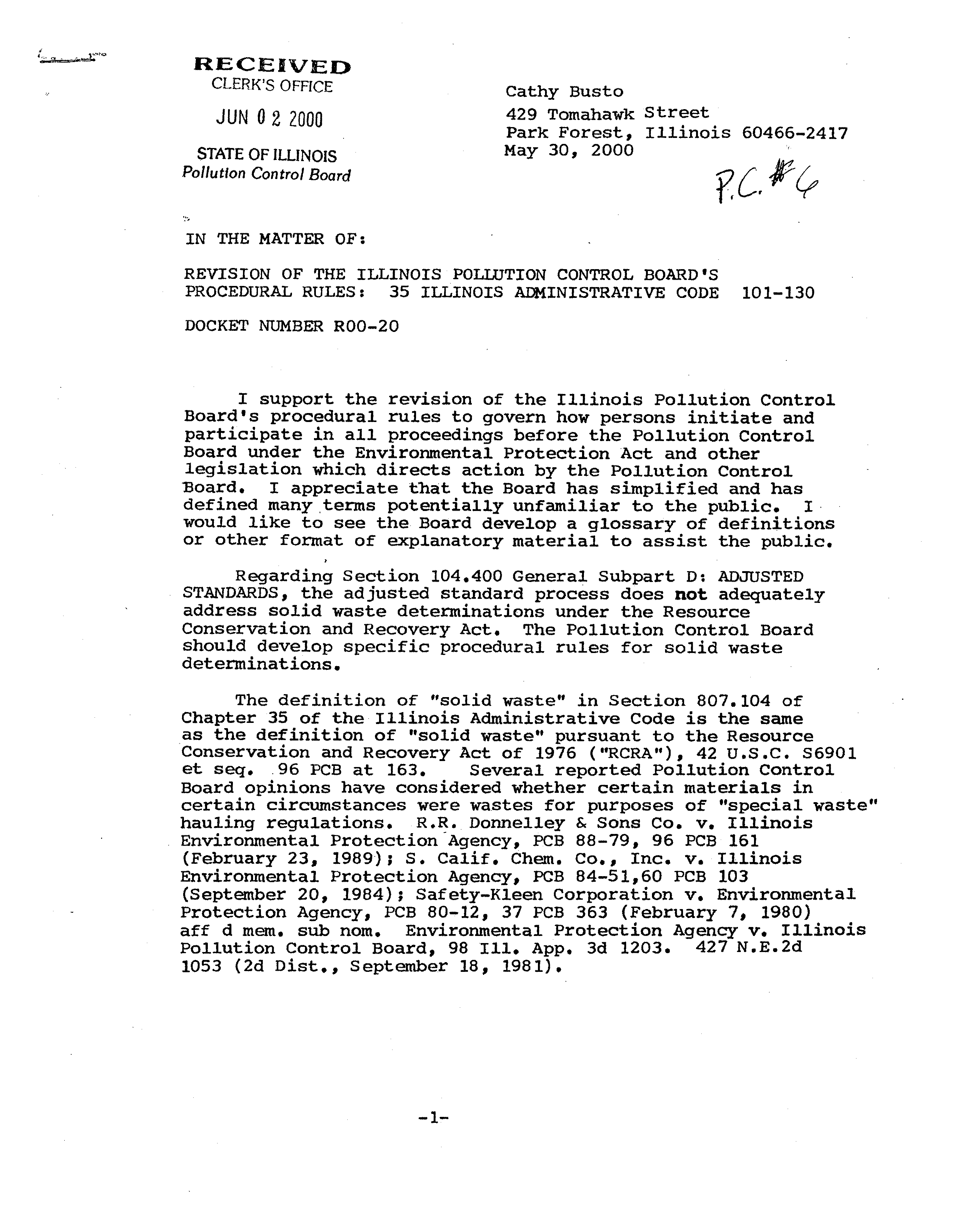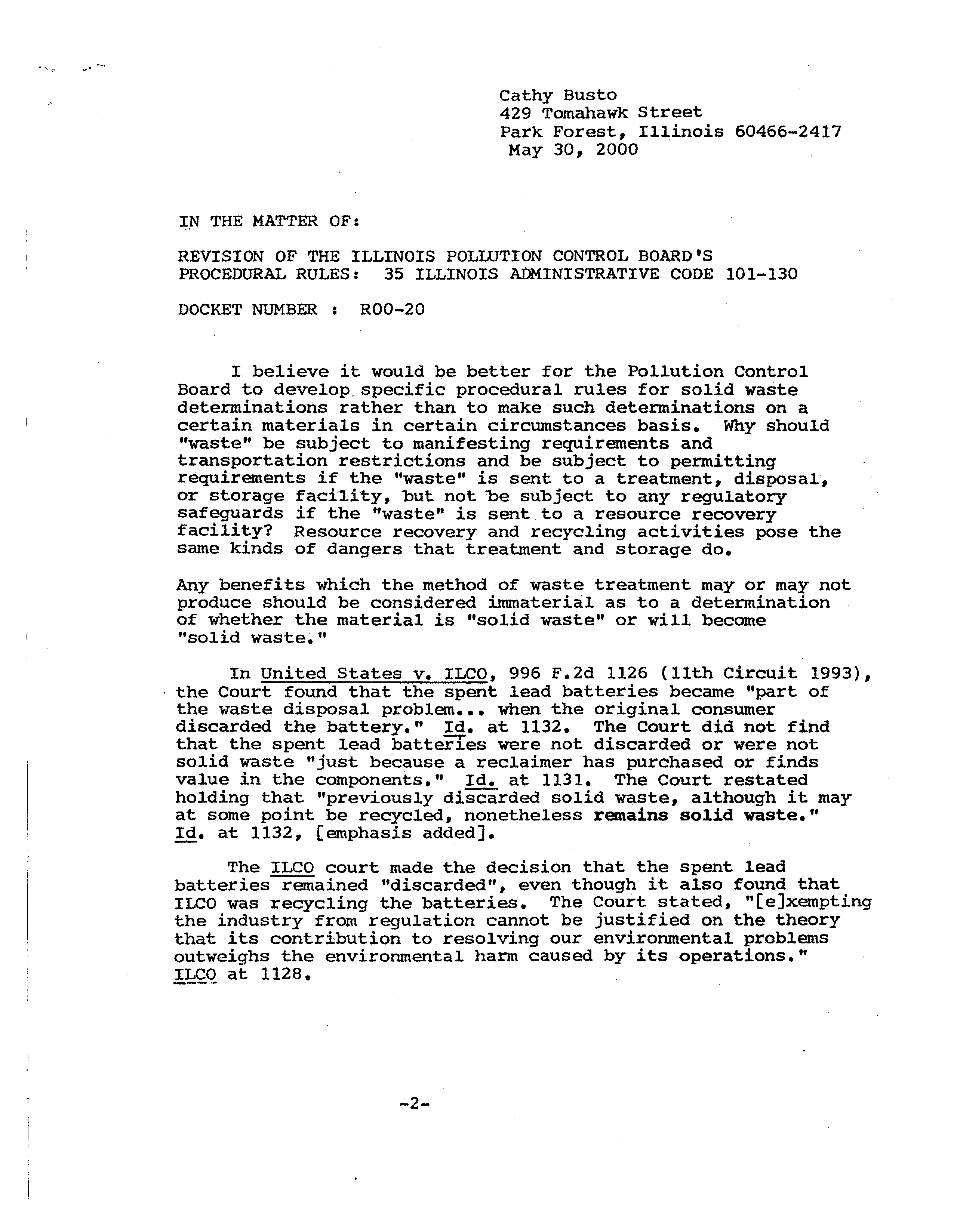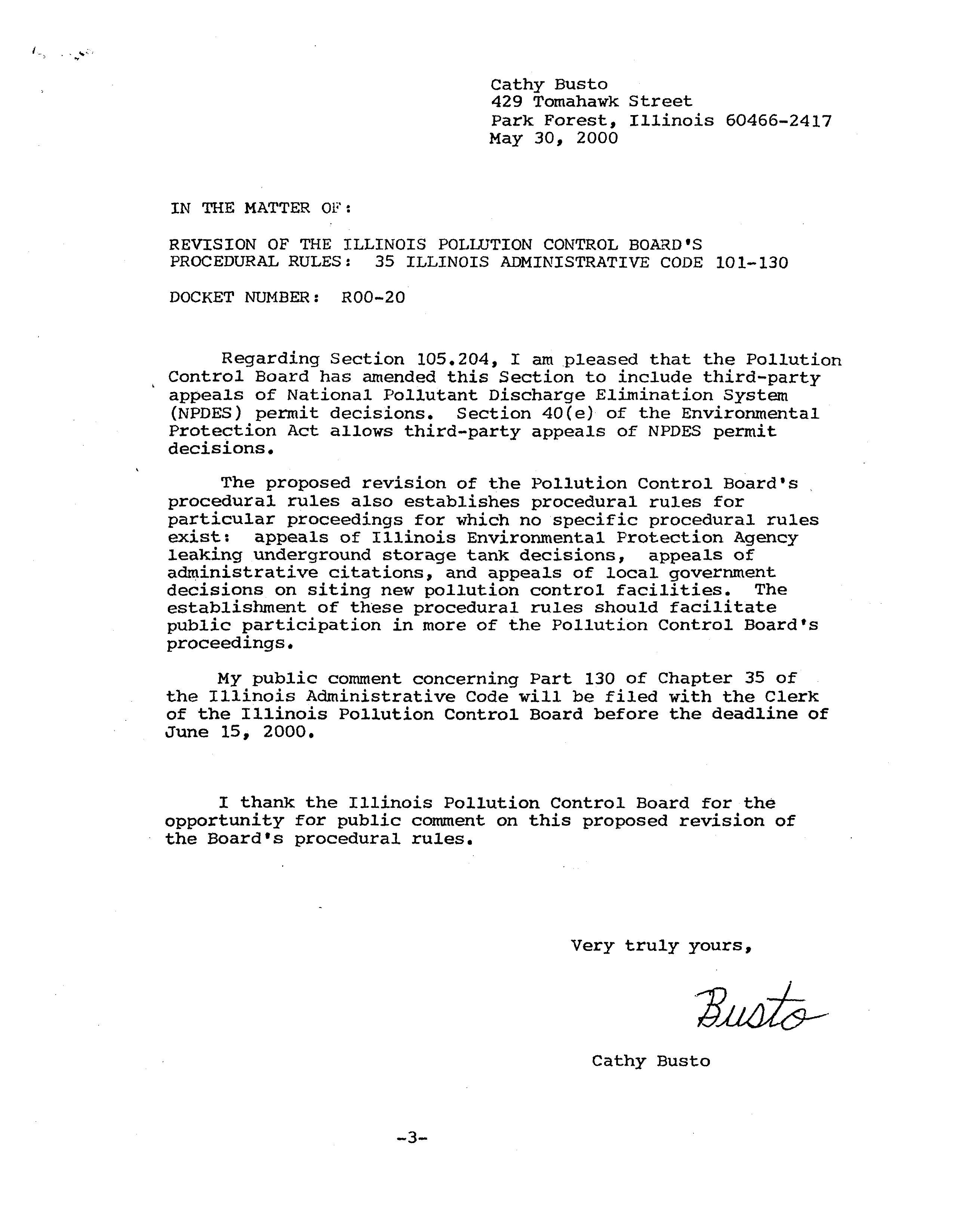RECEIVED
CLERK’S OFFICE
Cathy
Busto
JUN
0
2
2000
429
Tomahawk
Street
Park Forest, Illinois 60466—2417
STATEOFIWNOIS
May 30, 2000
Pollution Control Board
IN
THE
MATTER
OF:
REVISION
OF
THE
ILLINOIS
POLLUTION
CONTROL
BOARD ‘S
PROCEDURAL
RULES:
35
ILLINOIS
AL*UNISTRATIVE CODE
101-130
DOCKET
NUMBER
RO0-20
I support the revision of the Illinois Pollution Control
Board’s procedural rules to govern how persons initiate and
participate in all proceedings before the Pollution Control
Board under the Environmental Protection Act and other
legislation which directs action by the Pollution Control
~3oard. I appreciate that the Board has simplified and has
defined many terms potentially unfamiliar to the public.
I
would like to see the Board develop a glossary of definitions
or other format of explanatory material to assist the public.
Regarding Section 104.400 General Subpart
D: ADJUSTED
STANDARDS, the adjusted standard process does
not
adequately
address solid waste determinations under the Resource
Conservation and Recovery Act.
The Pollution Control
Board
should develop specific procedural rules for solid waste
determinations.
The definition of “solid
waste”
in Section 807. 104 of
Chapter 35 of the Illinois Administrative Code is the
same
as the definition of “solid waste” pursuant to the Resource
Conservation
and
Recovery Act of 1976
(“RCRA”),
42 U.S.C. S6901
et
seq.
.96 PCB at
163.
Several reported Pollution Control
Board opinions have considered whether certain materials in
certain circumstances were wastes for purposes of “special waste”
hauling regulations.
R.R. Donnelley & Sons Co.
v. Illinois
Environmental Protection Agency,
PCB
88-79, 96 PCB 161
(February 23,
1989); S. Calif. Chem. Co., Inc. v
Illinois
Environmental Protection Agency,
PCB
84-51,60 PCB 103
(September 20,
1984); Safety-Kleen Corporation v. Environmental
Protection Agency, PCB 80-12, 37 PCB 363 (February 7,
1980)
aff d mem.
sub
nom.
Environmental Protection Agency v. Illinois
Pollution Control Board, 98 Ill. App.
3d
1203.
427 N.E.2d
1053 (2d Dist,, September 18,
1981).
—1—
Cathy Busto
429 Tomahawk Street
Park Forest, Illinois 60466—2417
May 30, 2000
IN THE MATTER OF:
REVISION OF THE ILLINOIS POLLUTION CONTROL BOARD’S
PROCEDURAL RULES:
35 ILLINOIS ADMINISTRATIVE CODE 101-130
DOCKET
NUMBER
:
ROO-20
I believe it would be better for the Pollution Control
Board to develop, specific procedural rules for solid waste
determinations rather than to make such determinations on a
certain materials in certain circumstances basis.
Why
should
“waste” be subject to manifesting requirements and
transportation restrictions and be subject to permitting
requirements
if
the
“waste”
is
sent
to
a
treatment,
disposal,
or storage facility, but not be subject to
any
regulatory
safeguards if the “waste” is sent to a resource recovery
facility?
Resource recovery and recycling activities pose the
same
kinds of dangers that treatment and storage do.
Any
benefits which the method of
waste
treatment may or may not
produce should be considered immaterial as to a determination
of whether the material is “solid
waste”
or will become
“solid waste.”
In United States v.
ILCO, 996 F.2d 1126 (11th Circuit 1993),
the Court found that the spent lead batteries became “part of
the waste disposal problem.., when the original consumer
discarded the battery.”
Id. at 1132,
The Court did not find
that the spent lead batte~ieswere not discarded or were not
solid waste “just because a reclaimer has purchased or finds
value in the components.”
Id.
at 1131.
The Court restated
holding that “previously discarded solid waste, although it may
at some
point
be recycled, nonetheless remains solid waste.”
Id. at 1132, emphasis
added.
The ILCO court made the decision that~the spent lead
batteries remained “discarded”, even though it also found that
ILCO
was
recycling the batteries.
The Court stated,
“~exempting
the industry from regulation cannot be justified on the theory
that its contribution to resolving our environmental problems
outweighs the environmental harm caused by its operations.”
ILCO at
1128.
—2—
Cathy Busto
429 Tomahawk Street
Park Forest, Illinois 60466—2417
May 30,
2000
IN
THE
MATTER
OF:
REVISION
OF
THE
ILLINOIS POLLUTION CONTROL BOARD’S
PROCEDURAL RULES:
35 ILLINOIS ADMINISTRATIVE CODE 101-130
DOCKET
NUMBER:
ROO-20
Regarding Section 105.204,
I am pleased that the Pollution
Control Board has amended this Section to include third-party
appeals of National Pollutant Discharge Elimination System
(NPDES) permit decisions.
Section 40(e) of the Environmental
Protection Act allows third-party appeals of NPDES permit
decisions.
The proposed revision of the Pollution Control Board’s
procedural rules also establishes procedural rules for
particular proceedings for which no specific procedural rules
exist:
appeals of Illinois Environmental Protection Agency
leaking underground storage tank decisions,
appeals of
administrative citations, and appeals of local government
decisions on siting new pollution control facilities.
The
establishment of these procedural rules should facilitate
public participation in more of the Pollution Control Board’s
proceedings.
My public comment concerning Part 130 of Chapter 35 of
the Illinois Administrative Code will be filed with the Clerk
of the Illinois Pollution Control Board before the deadline of
June 15,
2000.
I thank the Illinois Pollution Control Board for the
opportunity for public comment on this proposed revision of
the Board’s procedural rules.
Very truly yours,
Lt~
Cathy
Busto
—3—




